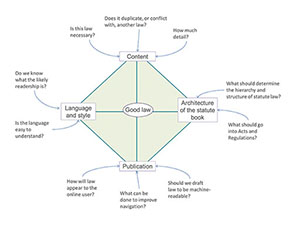6 Making law accessible
In Week 2 you explored the concept of the rule of law. Underpinning this were a number of criteria relating to the accessibility and openness of the law.
The Scottish Parliament does a great deal to ensure that its work is open and accessible to the public. The UK Parliament is also working to ensure the accessibility of its legislation. Making Acts easily available is an important part of this work. Here you explore whether what is being done is enough.
Box 5 Legislation and its impact
Legislation affects us all. And increasingly, legislation is being searched for, read and used by a broad range of people. It is no longer confined to professional libraries; websites like legislation.gov.uk [Tip: hold Ctrl and click a link to open it in a new tab. (Hide tip)] have made it accessible to everyone. So the digital age has made it easier for people to find the law of the land; but once they have found it, they may be baffled. The law is regarded by its users as intricate and intimidating.
That experience echoes observations that have been made about statute law for many years. The volume of legislation, its piecemeal structure, its level of detail and frequent amendments, and the interaction with common law and European law, mean that even professional users can find law complex, hard to understand and difficult to comply with.
Should we be concerned about any of this? After all, modern life in a developed country like the UK is complicated, and we use the law to govern many aspects of it. So it is not surprising that statutes and their subordinate regulations are complex; and it is perhaps reasonable to assume that citizens will need help or guidance in understanding the raw material of law.
But in my view, we should regard the current degree of difficulty with law as neither inevitable nor acceptable. We should be concerned about it for several reasons. Excessive complexity hinders economic activity, creating burdens for individuals, businesses and communities. It obstructs good government. It undermines the rule of law.
Over the past decade there has been a growing movement to make the wording of law more accessible. The UK Cabinet Office and Parliamentary Counsel have launched an initiative called ‘good law’ which aims to make legislation more accessible and understandable for UK citizens. They have undertaken a number of reviews and set the challenge of making law clear, coherent, effective and accessible.
The good law initiative is an appeal to everyone interested in the making and publishing of law to come together with a shared objective of making legislation work well for the users of today and tomorrow.
Listen to the following clip in which the former First Parliamentary Counsel, Richard Heaton, explores law and the language used. The clip makes reference to delegated legislation which you will explore in more detail in week Six. The clip is longer than some of the others you have encountered in your studies. Being able to listen to presentations, concentrate and identify their key points is an important skill. This clip contains material relevant to this week of study and to the following week of study. As you listen reflect on what you have learnt so far in this course. Think about how the points made in the clip are relevant to your studies.
Transcript
[MUSIC PLAYING]
[APPLAUSE]
[MUSIC PLAYING]
https://www.gov.uk/ guidance/ good-law - TEDx Houses of Parliament speech by former First Parliamentary Counsel Richard Heaton
The material in the clip is relevant to current debates about the volume of legislation, complexity of drafting and new ideas for review and reform. Through activities you have been introduced to the law making processes in both the Scottish and UK Parliaments and have begun to see the complexity that this creates.
The interconnectedness between four areas (content, language and style, publication and the statute book) that have traditionally been treated separately is shown in Box 9. Parliamentary Counsel are challenging law makers to consider each of the four from the different perspectives of citizens, professional users and legislators. Reform has been called for and is ongoing.
Think back to Activity 4 where you were asked to reflect on your experience of reading the National Galleries of Scotland Act 2003 and explanatory notes. Do your reflections support the need for an initiative such as the ‘good law’ initiative to make law more accessible and clearer?

